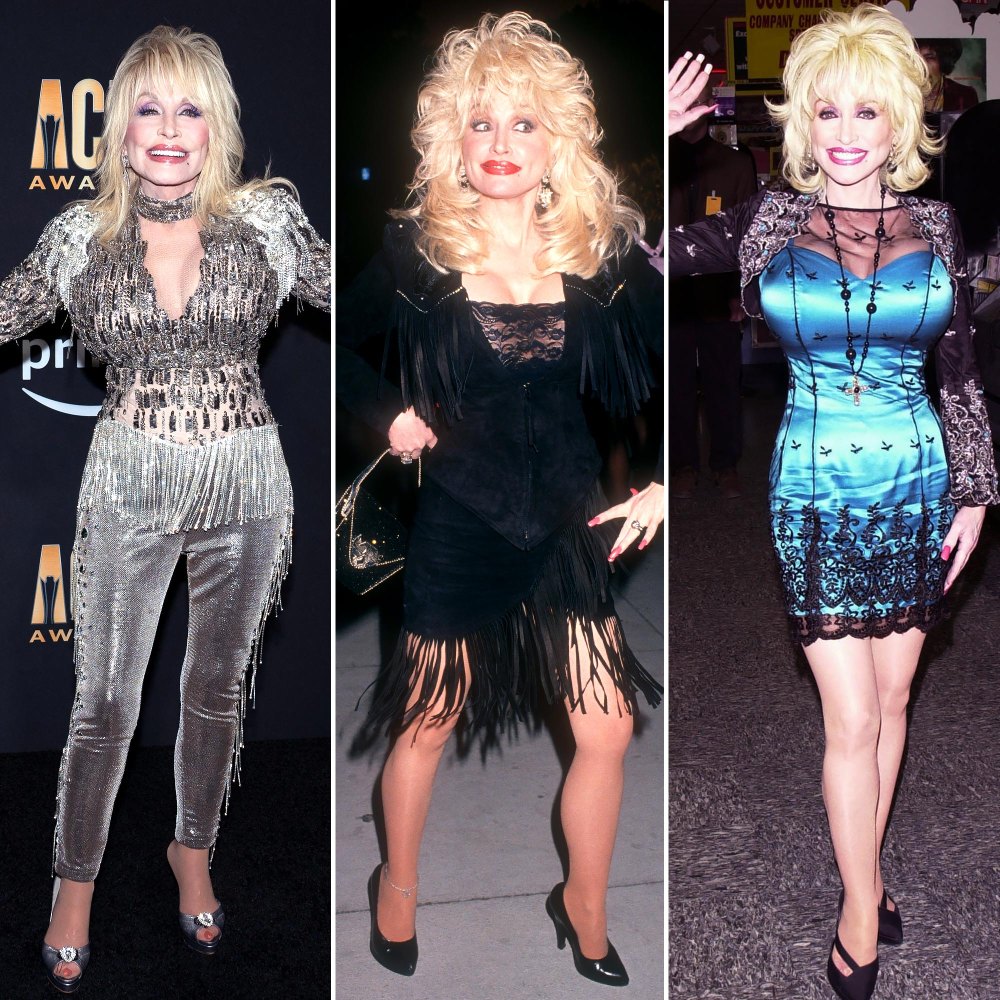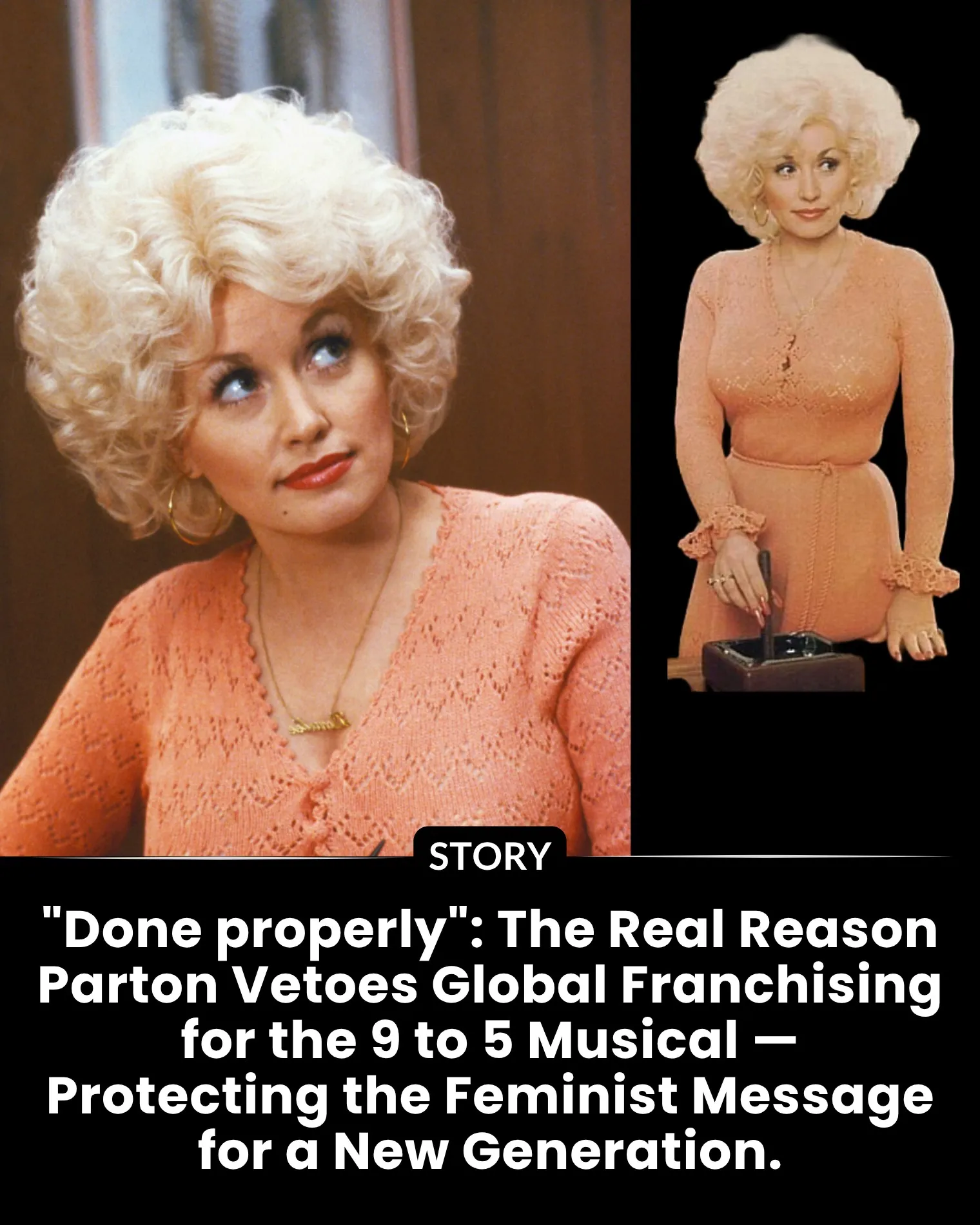A MUSICAL WITH A MISSION
9 to 5 The Musical is more than a Broadway hit. More than a nostalgic adaptation. More than a glittering stage tribute to Dolly Parton’s songwriting. For Parton, the show is a living, breathing testimony to workplace injustice, female solidarity, and the fight for dignity. It is a feminist narrative rooted in lived truth—not a commercial product to be endlessly duplicated.
This is why Dolly Parton, now 79, continues to veto blanket global franchising of the musical. While major producers push for international rollouts in dozens of markets, Parton draws a consistent line in the sand:
“I want to oversee it and make sure that it’s done properly.”
Her decision isn’t business hesitation—it’s artistic protection.
THE FEMINIST MESSAGE SHE REFUSES TO LET DILUTE
When 9 to 5 premiered in 1980, the film was revolutionary: three women overthrowing a sexist boss, fighting for equal pay, flexible hours, and respect long before mainstream culture acknowledged such issues. Decades later, the musical adaptation—packed with humor, empowerment, and Parton’s infectious score—carries the same message to a new generation.
But Dolly knows what Hollywood, Broadway, and global markets sometimes forget:
Feminism loses its force when it’s softened to fit convenience.
Franchising the show without close oversight risks turning a story about gender inequality into a “fun workplace comedy,” stripping away the urgency that made it iconic. Dolly refuses to let that happen.
“If you’re telling women’s stories,” she has said, “you better be honest, or don’t tell them at all.”
For her, 9 to 5 must remain bold, sharp, politically awake—not reduced to a pastel, corporate-friendly parody of itself.
:max_bytes(150000):strip_icc():focal(511x0:513x2)/dolly-parton-tout-1f911a7c96324d78bebb752595a64e61.jpg)
WHY BLANKET FRANCHISING IS A RISK
Most successful musicals eventually franchise globally: licensed out to regional theaters, school groups, cruise companies, and touring troupes. It’s a billion-dollar model. But Dolly rejects that automatic pipeline for one reason—quality control.
Global franchising can lead to:
-
watered-down scripts
-
inconsistent artistic direction
-
misinterpretation of the feminist themes
-
weak staging due to budget constraints
-
cultural sanitization to avoid controversy
-
microaggressions being played for laughs
-
“safe,” depoliticized performances
Dolly refuses to see her hard-fought message transformed into a generic feel-good show with no teeth.
9 to 5 was born from anger and injustice. She wants every audience, in every country, to feel that truth.
A PHILOSOPHY ROOTED IN “COAT OF MANY COLORS”
Dolly’s insistence on artistic integrity isn’t new—it is woven into her entire creative philosophy.
Her childhood-inspired classic, “Coat of Many Colors,” is the purest example. She wrote the song to honor the suffering, love, and poverty that shaped her. She has always said the story was “my blood and tears.”
To her, 9 to 5 is made of the same material.
Like Coat of Many Colors, it came from lived experience. Dolly began her career in male-dominated rooms, enduring casual sexism, underestimation, and pressure to conform. The story’s DNA—empowerment after humiliation—matches her own journey.
When she says she wants the musical “done properly,” what she means is:
The story deserves truth, not imitation.
The message deserves power, not prettiness.
The audience deserves the real thing, not a knockoff.

WHY THE MESSAGE STILL MATTERS—MORE THAN EVER
Parton is acutely aware that the world of work for women is changing, but not fast enough.
Workplace sexism still exists. Wage gaps still exist. Harassment still exists.
And in many countries where producers want to franchise the show, gender norms are even more rigid than they were in 1980s America.
Allowing 9 to 5 to proliferate without supervision risks cultural reframing that diminishes or even contradicts its feminist core. A careless director or timid producer could turn one of the strongest feminist statements in American musical theater into a “cute office musical.”
Dolly won’t let the world forget that 9 to 5 is a rebellion—not a romcom.
HER ROLE AS GUARDIAN OF THE MESSAGE
Dolly’s stewardship is personal. She approves casting. She approves major staging decisions. She ensures that Violet, Judy, and Doralee are portrayed as agents of change, not joke characters or caricatures of female frustration.
She mandates careful handling of the storyline centered around sexual harassment—never allowing it to be softened for “family friendliness” or played for laughs.
She blocks any script edits that would tone down the sexism of Mr. Hart, insisting audiences see the reality of what women faced—and still face.
In every market, every production, every version, Dolly wants the same thing:
Respect for the women whose lives inspired the story.
PROTECTING THE NEW GENERATION
To young women entering the workforce in 2025, many of whom are encountering misogyny in new digital and corporate forms, 9 to 5 is not nostalgia—it’s a mirror. Dolly wants them to see themselves in Violet’s frustration, Judy’s awakening, and Doralee’s resilience.
She wants the message to feel as urgent today as it did in 1980.
And she knows that requires precision, not mass production.
THE FINAL WORD
Dolly Parton could cash in on global franchising tomorrow. She could expand 9 to 5 into dozens of countries and add millions to her empire. But she won’t—not unless it’s “done properly.”
She protects the musical the way she protects all stories rooted in truth.
Like her “Coat of Many Colors,” it carries her blood, her tears, her history, her womanhood.
And until every production honors that legacy, she will keep the reins firmly in her hands.
Because Dolly Parton isn’t just a creator—
she’s a guardian of the truth behind her work.
